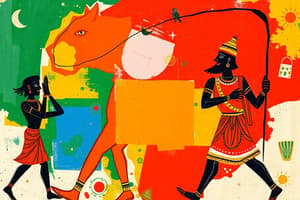Podcast
Questions and Answers
What is the approximate end date of the Indus Valley Civilization?
What is the approximate end date of the Indus Valley Civilization?
- 500 BCE
- 2500 BCE
- 3300 BCE
- 1300 BCE (correct)
Which river was the western area of the Indus Valley Civilization centered on?
Which river was the western area of the Indus Valley Civilization centered on?
- The Indus River (correct)
- The Tigris River
- The Ganges River
- The Nile River
What was the writing system of the Indus Valley Civilization known as?
What was the writing system of the Indus Valley Civilization known as?
- Vedic Script
- Indus Script (correct)
- Indus Manuscript
- Maurya Manuscript
Who founded the Maurya Empire?
Who founded the Maurya Empire?
In which modern-day country did the Maurya Empire stretch from Afghanistan to the south?
In which modern-day country did the Maurya Empire stretch from Afghanistan to the south?
What was a notable characteristic of the Maurya Empire?
What was a notable characteristic of the Maurya Empire?
During which time period were the Vedas composed?
During which time period were the Vedas composed?
What was the religious nature of Hinduism during the Vedic period?
What was the religious nature of Hinduism during the Vedic period?
What was the main social structure during the Vedic period?
What was the main social structure during the Vedic period?
What is a Janapada in the context of the Vedic period?
What is a Janapada in the context of the Vedic period?
Which ancient Indian ruler was known for spreading Buddhism to other parts of Asia?
Which ancient Indian ruler was known for spreading Buddhism to other parts of Asia?
Which ancient Indian civilization is known for its sophisticated urban planning and drainage systems?
Which ancient Indian civilization is known for its sophisticated urban planning and drainage systems?
Flashcards are hidden until you start studying
Study Notes
Ancient Indian History
Ancient Indian history is rich and diverse, encompassing various civilizations, empires, and periods. This article will explore three key periods: the Indus Valley Civilization, the Maurya Empire, and the Vedic period.
Indus Valley Civilization
The Indus Valley Civilization, also known as the Harappan Civilization, emerged around 3300 BCE and lasted until 1300 BCE. It was a Bronze Age civilization that spanned parts of what are now modern-day India and Pakistan. The civilization was divided into two major areas: the western area, centered on the Indus River, and the eastern area, centered on the Ganges River.
The Indus Valley Civilization was known for its advanced urban planning, with well-planned cities and sophisticated drainage systems. It was also known for its trade networks, which extended from the Mediterranean to Southeast Asia. The civilization's writing system, known as the Indus script, has yet to be deciphered, but it is believed to have been a form of proto-writing.
Maurya Empire
The Maurya Empire was a vast territory that stretched from modern-day Afghanistan and the Punjab in the north to the Kaveri in the south. It was the first major empire in India and was founded by Chandragupta Maurya in 321 BCE.
The Maurya Empire was known for its political stability and the establishment of a centralized government. The empire's most famous ruler was Ashoka the Great, who ruled from 268 to 232 BCE. Ashoka was a devout Buddhist who spread Buddhism to other parts of Asia and beyond through the establishment of the Mauryan missionary monks.
Vedic Period
The Vedic period refers to the time when the Vedas were composed, which spanned from 1500 BCE to 500 BCE. The Vedas were religious texts that contained the earliest known form of Hinduism, which was polytheistic. The Vedic period was also known for its social structure, which was divided into four main classes: the Kshatriyas, the Vaishyas, the Shudras, and the Brahmins.
The Vedic period also saw the rise of the city-states, or Janapadas, which were small kingdoms ruled by a raja, or king. The Janapadas were the political and economic units of the Vedic period and were sometimes ruled by the same raja.
In conclusion, ancient Indian history is marked by various civilizations, empires, and periods, each with its unique characteristics and contributions to the development of Indian culture and society. The Indus Valley Civilization, the Maurya Empire, and the Vedic period are just a few examples of the rich and diverse history of ancient India.
Studying That Suits You
Use AI to generate personalized quizzes and flashcards to suit your learning preferences.



